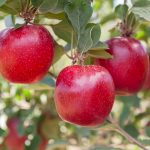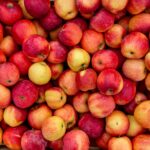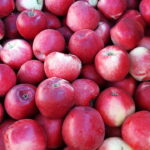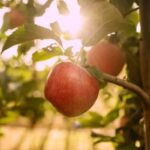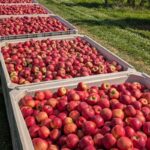Washington apples rebuilding Indian market

“We know that the discerning consumer is going to make the right choice. So as long as we have that opportunity, we’re good,” Todd Fryhover, says of Washington Apple’s renewed presence in the Indian market.

Todd Fryhover
After FreshFruitPortal.com initially reported June 23 on India’s dropping tariffs on U.S. apples, we had the chance to interview Fryhover, the president of the Washington Apple Commission, in depth on this topic. Washington is responsible for 99% of U.S. apple exports to India. The Indian government on June 23 lifted the 20% retaliatory tariffs levied in 2019 on U.S. apples and other agricultural imports. The retaliation was against U.S. Section 232 tariffs on steel and aluminum. It brought the total import tariff up to 70% on U.S. apples.
Fryhover indicates the Washington Apple Commission (WAC) gained this “trade policy win” after a consistent five-year push for a resolution. He credits U.S. Senator Maria Cantwell (D-WA) in particular and the hard work of Northwest Horticultural Council, and also USApple, for “wonderful” support.
Moving ahead, “All we want is an opportunity. Just give us an opportunity. From the Apple Commission standpoint, we have a lot of work ahead of us. We’ve lost a lot of ground. We had 53% market share when the duty went on. We’re now 1%.” This was a loss of roughly $175 million in sales. “The beauty is we have the network already in place. We still maintained the program.” WAC’s Indian trade consultant is still in place, “and he has his network of people. The U.S. Embassy, the Foreign Agriculture Service, is there right behind us. Helping us every step of the way. So, it’s going to be challenging but it should prove to be fruitful.”
India will lift the tariffs within 90 days, which coincides well with Washington’s fresh crop situation, Fryhover says. The 2022 crop was short, and India’s preferred Red Delicious is limited in volume.
Still, he tells FreshFruitPortal.com, “There’s going to be a lot of work ahead to regain our market share. Or at least regain a portion of our market share. And a lot of things have changed in the industry in the last five years also. I’m very excited about it, but I don’t see it as a low hanging fruit.”
Iran, Poland, and especially Turkey, filled in the apple supply vacuum left by Washington. But he notes that “almost every origin of apple has its own slot in India. Some are only in for a couple of weeks. But it’s a very crowded marketplace. Indians love apples. Of course, there’s 1.4 billion people…and you get a whole lot of them consumed.”
India has a very large apple industry in Uttar Pradesh state, which is in the north. The Indians are accustomed to fresh apples, and “they like to have them year-round, so it’s a real good market.”
But in that market, “We view ourselves as definitely the high value product. And that goes along with quality as well. Washington has a reputation, due to the high humidity and temperature in India, to show well on the shelf. We have a better and longer life.”
India’s wholesale market sells and distributes about 85% of apple imports. “Consumers shopping with modern retailers have the resources to spend a little bit of money for a product and a food safe product. We have a good reputation here in the U.S. as well on food safety.”
India’s largest grocery chain is Reliance Fresh. The firm’s website indicates it opened in 2006 and now operates more than 2,700 stores, selling over 200 metric tons of fruit a day.
Washington’s greatest export volume to India came in 2017-18, when eight million bushels were shipped. Of these, seven million were Red Delicious. Of the other million boxes, most were Galas, with a few Fujis and some other scattered varieties.
Fryhover expects the demand for Red Delicious will “hold true. They know the variety. They know the flavor. They know the shape. If they can meet the price expectations we have in the State of Washington, we absolutely can fill demand.”
He notes that over the last ten years “our fruit mix has really changed. We had moved away from mainstream varieties, the Reds, Goldens, Grannys, and Fujis, to more high value varieties, chasing the U.S, domestic consumer.” This brought “a whole host” of new include HoneyCrisp, Cosmic Crisp and Pink Lady.
Related articles: U.S. apples regain access to India
Fryhover adds that despite these changes, Washington’s apple acreage “hasn’t really changed. So, what has happened is those Red Delicious orchards, that were 500 trees per acre and were being sold for $16, $17, $18 a box came out, and new varieties went in at 1,500 to 2,000 trees per acre.” Popular new varieties from these dense plantings are now bringing growers $30 to $40 per bushel. “If they’re organic, they’re a whole other category. So, we’ve had a lot of change since this tariff was in place.” In 2014, Washington produced 44 million bushels of Red Delicious. That production is now 13 million.
While it’s early to estimate - Washington’s 2023 apple harvest won’t begin until late August – it’s expected the crop will be about 115 million to 120 million bushels. A very condensed bloom period may have taken down volume from a potential of 135 million boxes. Last season the estimate was for 125 million, when the actual numbers were 102 million. The reality became that, “our crop was down this year 20 million bushels. We were off 20 percent” from the previous season on exports.

Washington apple packing plant.
Washington’s Red Delicious harvest typically runs in September and October. In that timeframe, packers build inventories for domestic customers. Then in late October and early November and “they start thinking about long term market opportunities for single varieties like Red Delicious.” Fryhover expects exporters to start shipping to India in November, “with arrivals in the first two weeks of December and that’s when our programs would really start to kick in.” Exports to India may run as late August 2024, on the cusp of a new crop.
Fryhover notes, “Red Delicious hold well in cold storage and our cold chain is good, at least until it gets to India, so we’ll ship until we run out of fruit, essentially.”
Fryhover, who’s traveled in India at least ten times, said Washington apples historically have shipped throughout India. The major Indian seaports receiving Washington apples are Chennai in the south and Kolkata and Mumbai to the north. “Chennai is really the hub” of distribution, covering southern and central India.
Key debarkation seaports for the apples are Seattle and Tacoma. The travel time for reefer ocean containers is around 40-45 days. Fryhover notes that his “growers are members of warehouses, who are members of sales groups. Almost all sales groups over the last decade have shipped to India. All use 100% container ships.”

















